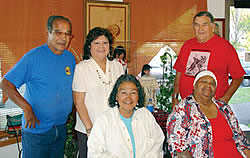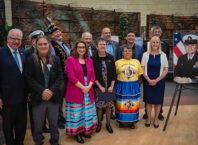 Recent changes at Elders Lodge (an independent living community in Saint Paul that is supposed to provide affordable, service-enriched housing for low-income adults age 62 and older) include new staff and an expanded Board of Directors.
Recent changes at Elders Lodge (an independent living community in Saint Paul that is supposed to provide affordable, service-enriched housing for low-income adults age 62 and older) include new staff and an expanded Board of Directors.
The positive changes came as a result of concerns over neglect and mismanagement and were celebrated with a Spring Feast.
Among the concerns: residents felt unsafe because non-residents had
keys, there were strangers drinking in the halls, and Wilder Foundation
staff (who manage Elders Lodge) mediated disputes based on stories
rather than evidence because there were no cameras. Residents also
alleged the previous housing manager, a Native American woman suspended
from her Wilder Foundation position after an October 2007 complaint
with the St. Paul Department of Human Rights, was incompetent and
emotionally abusive to some elders. (She couldn’t be reached for
comment, and Wilder Foundation does not discuss personnel issues.)
“She was a controller. It was her way or no way,” said an elder who
wished to remain anonymous. “One time she ordered a woman to stay in
her room for months.”
That previous manager also brought paperwork from Wilder Foundation to
the Board members. At the time, many of them were residents and
neighbors without board experience. “She would be in a rush and give us
papers,” said another elder who asked to remain anonymous. “She told
people to sign papers when we didn’t know what they were.”
In 2007, some elders grew concerned when the Board Chair was also the
brother of that manager’s boyfriend. The conflict of interest appears
to have added to the intimidation and lapses in oversight.
These concerns led to the 2007 complaint with the Department of Human
Rights. It contained charges of maltreatment, neglect, verbal abuse,
and reprisal.
St. Paul Department of Human Rights Director Tyrone Terrill said the
department does not discuss closed cases. However, a Pre-Determination
Settlement Agreement from his office established initial criteria for
the recent changes.
The issues behind the complaint are rooted in the complex status of
Elders Lodge, a public housing project that brings together four
distinct organizations:
1) Elders Lodge Corporation (ELC), a nonprofit governed by the Board of Directors, which owns the land and building;
2) the U.S. Department of Housing and Urban Development (HUD), which
funds the building as Section 202 affordable housing for low-income
elderly. Tenants pay 30% of their income, and HUD provides rental
assistance and reserves for improvements and repairs;
3) the Amherst H. Wilder Foundation, which manages the site. HUD
requires an experienced management agent for all its projects, so the
Board has maintained a contract with the Foundation since the Lodge
opened in 1997;
4) and a Resident Council to represent the concerns of tenants. Its
existence and right to privacy are protected not only by HUD
regulations, but also by ELC Bylaws.
Since the complaint, the Board, Wilder Foundation, and Resident Council
have made an effort to develop a more responsive, working relationship.
HUD monitors the changes but allows its projects as much autonomy as
possible.
The settlement agreement between the Department of Human Rights and
Wilder Foundation contained a provision for an expanded Board with an
option for future board training. New Board members include Norma
Renville (Sisseton-Wahpeton Dakota and Ojibwe), David Glass (Ojibwe),
Clyde Bellecourt (Ojibwe), Grace Smith (Pitkas Point Yup’ik), Louise
Ittner, Steve Blake, Bob White, and Lloyd Kasten. The agreement also
stipulated that Wilder Foundation work with the Board to provide more
Native American cultural activities such as crafts, Native holidays,
and a sweat lodge.
“We want to have cultural events at least twice a month,” said
Bellecourt. “If loved ones are in the hospital or an elder is in
mourning, we want to support them.”
Wilder Foundation was also expected to repair the intercom and install
security cameras; to reimburse unaccounted funds from resident
fundraising in the amount of $200 and document how the remaining funds
were allocated; to update all emergency contacts annually; and to write
a job description for the newly vacant Housing Manager position and
advertise it in Native American media.
The Board has already overseen the installation of cameras and a
keyless fob entry system. Teri Davids, Communi-cations Director at
Wilder, said much of the work was paid for by Wilder Foundation as a
donation to Elders Lodge.
With the positive momentum and new board members, the Resident Council
hopes to be a more integrated partner. They believe they have a unique
perspective, and the original Elders Lodge mission was to create a home
where elders could share their wisdom and spiritual traditions with the
community.
Grace Smith, who served as a catalyst for change, hopes for further
improvement. “I’m tired of the elders suffering,” she said. “They have
little power or formal education, but people have to respect them and
their Native American beliefs. We’re moving in a better direction, but
it takes a while.”
One obstacle to more improvements is the ELC debt. Although it is
manageable and Renville says the Board will eliminate it, ongoing debt
has lingered between ELC and Wilder Foundation. The debt has multiple
sources. It began in 1997 when the ELC Board split from EarthStar, the
sponsor organization that did the initial fundraising to create Elders
Lodge. As construction proceeded on the $2.9 million project, the two
Boards sued each other over EarthStar finances, ELC Board membership,
and money from bingo at Pot O’ Gold Casino.
In the meantime, Wilder Foundation was signed to provide services and
worked several months without payment because of the lawsuits. So ELC
owed money from the first contract.
Vacancy rates in subsequent years are a primary source of the current
debt. ELC earns income from rent and HUD assistance. Vacancies cause
that to drop, but the expense of maintaining the building remains the
same. HUD has asked Wilder Foundation and the Board to correct this
with better marketing and outreach.
Another source of debt is the lack of fundraising. Wilder Foundation
does not apply for grants on behalf of Elders Lodge. The decision to
seek grants must come from the Board, but ELC needs initial funding and
supervision to move ahead because grants require monitoring and
reporting.
Renville promises the Board will develop a vision and strategic plan
that include new revenue streams. “It takes time. We need trainings and
surveys,” said Renville. “We need solid roots so the tree can bloom.”
Both Renville and Glass said the expanded Board represents a strong
cross-section of the community and will be attentive to these details.
Due to past experience, some elders worry Wilder Foundation won’t make
Elders Lodge a top priority. There have been late reports to HUD,
delayed annual budgets, and problems found during physical inspections.
But overall, the elders appreciate the improvements and are grateful
for the new staff.
Elders are particularly pleased with the housing manager, Susan
LeClaire (Rosebud Lakota). She helped organize the Spring Feast for the
annual meeting in May, which began with drummers from Anishinabe
Academy and a blessing by Jerome Otter Robe.
Before the feast, Renville (Board Chair) welcomed everyone, and Glass
(Board Treasurer) presented the financial review for fiscal year 2007.
The open annual meeting and feast with wild rice and fried bread are
signs of the positive change residents requested.
Another welcome change was the hiring of a new site responder, Cory
Matlock (Blackfoot and Cherokee) who lives at Elders Lodge and provides
companionship and daily assistance.
Residents also appreciate
that wakes are being held at Elders Lodge again. Bodies were not
always brought for mourning ceremonies, but the Board has directed
Wilder Foundation to allow for this practice. “Wilder is here to help
provide a culturally comfortable and homelike atmosphere,” Davids
said. “So we want to honor the different Native and tribal cultures.”
The Board also arranged for a recent Midewiwin water drum
ceremony. Additional signs of renewal include the money and seeds
elders received to plant gardens, and LeClaire updated the lobby and
library with second-hand purchases.
“We’re like a family,” said Resident Council Secretary Arlene Fire
(Hunkpati Dakota and Caddo). “We all share, we help each other. We want
to create a cooperative way of living. This is what we want our future
generations to learn.”
The four Elders Lodge organizations welcome friends and family who want
to visit, offer donations, provide activities, or host events at the
lodge. They invite Native American groups to consider the elders.
“Many elders need transportation to activities. They do not have cars
or they need equipped vans,” Renville said. “We need to remember our
elders as we plan events.”
Laura Simpson, HUD Project Manager, said the grassroots quality of the
Board encourages greater involvement. “Although grassroots boards
sometimes struggle with the business and finances, they are often more
interested in the tenants and their families. They usually get more
involved.”
The elders are proud of the community they are rebuilding and hope the
new direction will bring transparency, full participation, and peace
and unity to their home. They also hope recent changes lead to more
consistent Board and community involvement.
“We still have a long way to go, but we’re grateful for Susan and
Cory,” said Smith. “It gives me strength to see the elders talking and
active. They have had enough neglect.”
For events, contact Susan LeClaire, Housing Manager at 651-778-2501.






